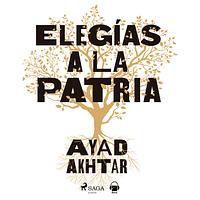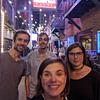Take a photo of a barcode or cover
Amazing! This blend of memoir and fiction traces the lives of a Pakistani-American family from Wisconsin. It presents a different perspective on 9/11 and Trump’s presidency. Highly recommended.
emotional
informative
reflective
medium-paced
Plot or Character Driven:
Character
Diverse cast of characters:
Yes
Boils down to: The US sucks. I love the US.
Feels as though the author couldn’t decide between memoir, fiction, or essays, but whatever the form, he could have used a better editor. Cringeworthy, gratuitous sex scene, loads of pontificating, and dialog that is anything but believable. There’s a germ of a what could have been a fantastic story that evokes Exit West, but the author strays too far, unfortunately.
Feels as though the author couldn’t decide between memoir, fiction, or essays, but whatever the form, he could have used a better editor. Cringeworthy, gratuitous sex scene, loads of pontificating, and dialog that is anything but believable. There’s a germ of a what could have been a fantastic story that evokes Exit West, but the author strays too far, unfortunately.
medium-paced
4.5 This was a really interesting read, both in subject and method of story telling.
This was a hard one to rate - it certainly had flashes of brilliance and relatability, but that got confused in the jumble of what-is-this-book-even-about? I think Akhtar’s presentation of this as fiction, while trying to include pages upon pages of factual history and personal interaction, makes the book challenging. What information am I supposed to take away as true, and what am I supposed to trust is made up? There’s no way to know. If this was fully a memoir, I could understand the nonchronological and self-obsessed storytelling - but it’s not, so I think it could have done with much sharper editing.
Stars are here for the really poignant, infrequent bursts of beautiful and evocative language, and some factual history that was informative (like the sections on capitalism and Robert Bork). I’d recommend people to treat the book like a series of essays and skip several chapters - you don’t need to read it like a novel.
Stars are here for the really poignant, infrequent bursts of beautiful and evocative language, and some factual history that was informative (like the sections on capitalism and Robert Bork). I’d recommend people to treat the book like a series of essays and skip several chapters - you don’t need to read it like a novel.
I'd like to give this a 4 1/2. Despite the weighty subjects, it was very easy to become absorbed in each of the chapter/essays. Tackles an enormous amount of issues from a very interesting perspective.
I thought Homeland Elegies was one of the best books I have read in 2020, right up there with The Water Dancer by Ta-Nehesi Coates. While Mr. Akhtar's description of being the child of immigrants in our predominantly White country was very insightful, I really respect his critique of our current economic and political climate.
3: Homeland Elegies by Ayad Akhtar.
Wow.
This book. I am not certain I have ever read anything quite like it. And it's going to take me a while to figure out I really think about it in its entirety.
It's a novel. But...the main character shares his name with the author...exactly. And "facts" of the main character's background and experience match, completely, the background and experiences of the author's. He was raised in Brookfield, Wisconsin...just down the highway from here. He is a year younger than I am, so I thought lots about our parallel childhoods...trusted him as the teller of those stories and all that I could learn from the major differences between the two, primarily that his life as a brown man in America has been quite different from mine as a white woman. But there are certainly places where things intersect: love of reading, for just one. But while his was inspired by a high school English teacher, mine was fueled by becoming a high school English teacher. Regardless, I bought in...to believing all that he is then sharing is "true."
So as I am sucked in and pondering all of these details he shares, I find myself doing my own research, looking up authors he mentions who are unknown to me, and at one point researching the name of a particular person--not an author--whom he is saying things about making me think: wait...what happened to him? Did he die? How in the world is Akhtar saying these things about him--fairly incriminating things--if he is, himself, alive and kicking and seemingly would defend himself, not allow this all to be told.
And then I learn that I have been com-plete-ly pulled into this fiction as non-fiction and am buying it all 100%. But. Some is true. What is not? I have no clue.
And does it matter, really? I'm not sure.
He hasn't fibbed (like Frey in his Million Little Pieces, claiming as memoir, even, what is not substantiated). But he hasn't fully created fiction either. What's true? What's made up? Does it matter?
It does not matter, my new day's thinking says. Akhtar says profound and interestingly thoughtful things, relevant and meaningful things--about America's foundations, about politics, about race, and more--and whether they come through his own person or his created character really does not matter an iota, ultimately. I greatly appreciate the playing with rhetoric--the logos, ethos, pathos manipulated a little or a lot--that Akhtar does here. It's smart and deliberate, and it works.
I'll be eager to hear what others think.
Wow.
This book. I am not certain I have ever read anything quite like it. And it's going to take me a while to figure out I really think about it in its entirety.
It's a novel. But...the main character shares his name with the author...exactly. And "facts" of the main character's background and experience match, completely, the background and experiences of the author's. He was raised in Brookfield, Wisconsin...just down the highway from here. He is a year younger than I am, so I thought lots about our parallel childhoods...trusted him as the teller of those stories and all that I could learn from the major differences between the two, primarily that his life as a brown man in America has been quite different from mine as a white woman. But there are certainly places where things intersect: love of reading, for just one. But while his was inspired by a high school English teacher, mine was fueled by becoming a high school English teacher. Regardless, I bought in...to believing all that he is then sharing is "true."
So as I am sucked in and pondering all of these details he shares, I find myself doing my own research, looking up authors he mentions who are unknown to me, and at one point researching the name of a particular person--not an author--whom he is saying things about making me think: wait...what happened to him? Did he die? How in the world is Akhtar saying these things about him--fairly incriminating things--if he is, himself, alive and kicking and seemingly would defend himself, not allow this all to be told.
And then I learn that I have been com-plete-ly pulled into this fiction as non-fiction and am buying it all 100%. But. Some is true. What is not? I have no clue.
And does it matter, really? I'm not sure.
He hasn't fibbed (like Frey in his Million Little Pieces, claiming as memoir, even, what is not substantiated). But he hasn't fully created fiction either. What's true? What's made up? Does it matter?
It does not matter, my new day's thinking says. Akhtar says profound and interestingly thoughtful things, relevant and meaningful things--about America's foundations, about politics, about race, and more--and whether they come through his own person or his created character really does not matter an iota, ultimately. I greatly appreciate the playing with rhetoric--the logos, ethos, pathos manipulated a little or a lot--that Akhtar does here. It's smart and deliberate, and it works.
I'll be eager to hear what others think.
Wow, What a beautiful book, I am SO happy to have bought this and read this, This is a must read!

